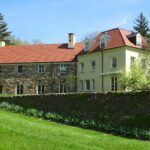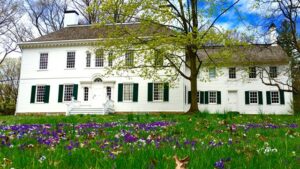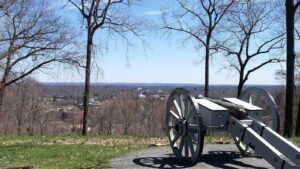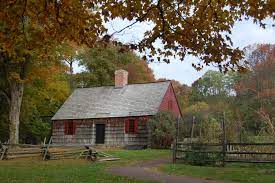Morristown National Historical Park – Brigade Area and Cross Estate

When the New Jersey troops arrived in Jockey Hollow in mid-December 1779, there was no suitable camp site available. Instead, the troops moved a few miles south of Jockey Hollow, encamping on a hillside near Ayer’s iron forge. The soldiers built their log cabins and moved into them by Christmas Day. The Jersey troops camped here from December 1779 until April, when they moved into huts in Jockey Hollow that had been vacated by the Maryland Brigade.
Today, the site of the New Jersey Brigade encampment is marked by interpretive signs. It can only be reached by a hiking trail, which can be accessed at the New Jersey Brigade parking area at the Cross Estate.
John A. and Ella Bensel built the Cross Estate house in 1905, and William R. and Julia Newbold Cross purchased it in 1929. Both families were part of a trend of wealthy industrialists and financiers who established country homes in the Morristown area and Bernardsville’s “Mountain Colony.”
As you explore the mansion’s grounds, you’ll discover a few of its Bensel-era remnants, including a five-story, stone water tower and a large silver maple tree the Bensels planted in 1906.
The house was remodelled in 1940 after the death of William R. Cross, but the gardens remain the most significant contribution the Cross family made to the estate. View the garden and enjoy the legacy left by Julia Newbold Cross and her landscape architect Clarence Fowler. Volunteers have cared for this garden since 1977.
In 1975, Morristown National Historic Park purchased this property to protect the adjacent Revolutionary War New Jersey Brigade encampment area and connect to the Jockey Hollow section of the park. The house and grounds of this former private estate have recently been declared eligible for National Historic Landmark status.




